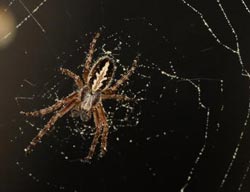Spiders partial to a side order of pollen with their flies

Orb weaver spiders -- like the common garden variety -- choose to eat pollen even when insects are available.<br><br>Credit: Dirk Sanders<br>
Dr Dirk Sanders of the University of Exeter demonstrated that orb web spiders – like the common garden variety – choose to eat pollen even when insects are available.
Spider webs snare insect prey, but can also trap aerial plankton like pollen and fungal spores.
Dr Sanders, alongside Mr Benjamin Eggs from the University of Bern, conducted feeding experiments and a stable isotope analysis on juvenile spiders to see whether they incorporate plant resources into their diet.
They discovered that 25 per cent of the spiders' food intake was made up of pollen, with the remaining 75 per cent consisting of flying insects.
The spiders that ate both pollen and flies gained optimal nourishment, with all essential nutrients delivered by the combination.
Dr Sanders, of the Centre for Ecology and Conservation at the University of Exeter's Penryn Campus, said: “Most people and researchers think of spiders as pure carnivores, but in this family of orb web spiders that is not the case. We have demonstrated that the spiders feed on pollen caught in their webs, even if they have additional food, and that it forms an important part of their nourishment.
“The proportion of pollen in the spiders' diet in the wild was high, so we need to classify them as omnivores rather than carnivores.”
Orb web spiders regularly take down and eat their webs to recycle the silk proteins, and it had been suggested they may 'accidentally' consume the pollen during this process.
But the study found this to be impossible due to the size of the grains ingested, indicating that they were actively consumed by the spider coating them in a digestive enzyme before sucking up the nutrients.
The research paper, Herbivory in Spiders: The Importance of Pollen for Orb-Weavers, is published in the journal PLOS One.
Media Contact
More Information:
http://www.exeter.ac.ukAll latest news from the category: Life Sciences and Chemistry
Articles and reports from the Life Sciences and chemistry area deal with applied and basic research into modern biology, chemistry and human medicine.
Valuable information can be found on a range of life sciences fields including bacteriology, biochemistry, bionics, bioinformatics, biophysics, biotechnology, genetics, geobotany, human biology, marine biology, microbiology, molecular biology, cellular biology, zoology, bioinorganic chemistry, microchemistry and environmental chemistry.
Newest articles

High-energy-density aqueous battery based on halogen multi-electron transfer
Traditional non-aqueous lithium-ion batteries have a high energy density, but their safety is compromised due to the flammable organic electrolytes they utilize. Aqueous batteries use water as the solvent for…

First-ever combined heart pump and pig kidney transplant
…gives new hope to patient with terminal illness. Surgeons at NYU Langone Health performed the first-ever combined mechanical heart pump and gene-edited pig kidney transplant surgery in a 54-year-old woman…

Biophysics: Testing how well biomarkers work
LMU researchers have developed a method to determine how reliably target proteins can be labeled using super-resolution fluorescence microscopy. Modern microscopy techniques make it possible to examine the inner workings…





















